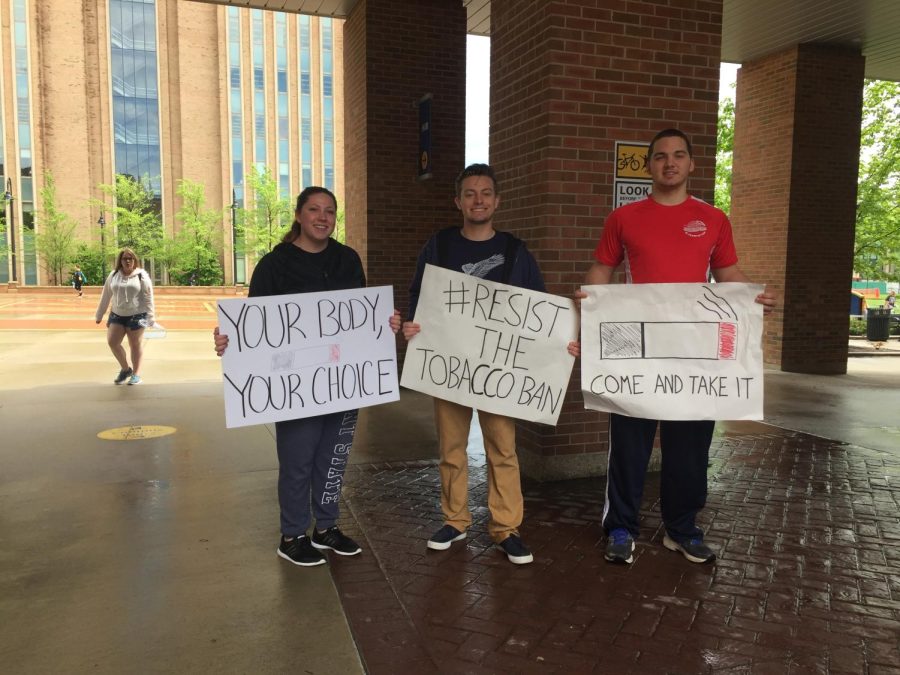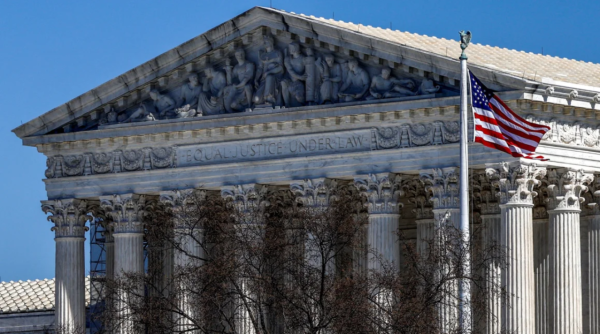Pro-Liberty group holds protest against smoking ban
Members of the Young Americans for Liberty group at Kent State hold up signs May 1 protesting the smoking ban set to begin on July 1 of this year.
May 2, 2017
The Young Americans for Liberty (YAL) organization stood outside the Student Center Monday displaying signs that proclaimed “your body, your choice” and “come take it” in protest of the upcoming smoking ban.
The group said their goal is to revoke or alter the smoking ban that is set to be implemented July 1 on all Kent State campuses through a petition they created.
“We’re opposed to (the ban) because it’s a violation of students’ civil liberties,” said Kevin Cline, the president of YAL.
Cline said the organization hopes to gather over a hundred signatures to come up with legislation to overturn the ban.
While Cline and the group see the issue as a violation of civil liberties, senior biology student Olivia Hill has a different take.
“I think (the policy) ignores things that may not be hurtful to people, like CBD oil — which is legal — and can be helpful for people with illnesses, and it can be vaped in a pen,” Hill said.
Cannabidiol oil, or CBD, is a type of oil typically used by people with certain diseases or for those who have chronic pain. The oil provides pain reduction and increased relaxation without the psychoactive properties that come with smoking marijuana, according to the National Library of Medicine.
The new university smoking policy states “all forms of smoking are prohibited, including the use of electronic smoking devices, mod boxes or electronic nicotine delivery systems that create an aerosol or vapor. Also prohibited is the use of nicotine, tobacco-derived or plant based products and oral tobacco. Restricted products include cigarettes, cigars, cigarillos, cloves, hookahs, e-cigarettes, herbal and oil vaporizers, pipes, water pipes, all smokeless tobacco (chew, snuff, dip, etc.) and all other non-FDA approved nicotine products. FDA approved nicotine replacement therapy will be allowed (e.g., patches, gum, inhalers, and lozenges).”
“Myself and multiple people use it to function all day, so if we can’t smoke on campus, that means we also can’t vape CBD oil,” Hill said.
Hill and Cline both see designated smoking areas as an alternative to the ban.
“I don’t think anybody should be exposed to chemicals that they don’t want to be exposed to … but there’s some type of happy medium we need to come to,” Cline said.
“Hopefully, we can set up some designated smoking areas so we can avoid the secondhand smoke issue, but also give students back their liberty to make their own choices for their body and what they put into it,” Cline said.
Hill said she sees Cline’s idea as a reasonable option, “just so long as they don’t ban it completely.”
Andrew McVicker, a freshman nutrition major, is not only against the ban, but questions the practicality of it.
“If you look at the statistics of how many people smoke at Kent State, you can’t make — let’s say 5,000 or so people between students, faculty, and visitors — to quit smoking if they’ve been doing so for years,” McVicker said.
In the end, those who oppose the ban come back to the issue of their rights being challenged.
“I understand the health benefits of it, but it’s your right to smoke if you want to,” McVicker said.
The implementation of the smoking ban is aligned with the university’s healthy campus initiative: Kent State of Wellness, which aims at making campus a healthful environment for both students and faculty, according to the university’s website.
“The university needs to make sure that students can use tobacco products and make their own health choices for themselves,” Cline said. “The university should not be a ‘nanny university’ making the health choices for us.”
Nicholas Hunter is a general assignment reporter, contact him at [email protected]























